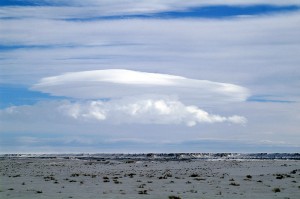tír + scamall + fada + bán = Aotearoa (probably!) Posted by róislín on Jun 5, 2014 in Irish Language
(le Róislín)

Scamall fada bán mar seo atá i gceist san ainm “Aotearoa,” b’fhéidir — cé go bhfuil an ceann seo thar Wyoming (nasc thíos)
So what was that dú-shlán [DOO-hlawn] mentioned in the last blog (nasc thíos). Gaeilge a chur ar Mhaorais (to translate Maori to Irish)? Bhuel, cén fáth nach ndéanfaí sin (Well, why not, lit. why wouldn’t that be done)?The hitch is, here, that I’m just going to set out the vocabulary in this blog, and see if any readers take up the challenge of putting the phrase together. An freagra, nó mo leagansa d’fhreagra? Sa chéad bhlag eile.
First, also let me mention that “land of the long white cloud” is just one interpretation of what “Aotearoa” actually means. A couple links to sources discussing this further are listed in the links below.
If we accept “land of the long white cloud” as our basic phrase, here are the four main words, with some variant possibilities. As with any “possessive” phrase in Irish, there will be no word equating to “of.” Irish uses the genitive case (an tuiseal ginideach) to express possession, even when it’s in the more descriptive sense, not ownership as such. A typical example is “Tír na nÓg” (land of the young, where the extra lower-case “n” is the real tip-off that the phrase is genitive).
land: most typically, “tír” although there is also “talamh,” which can mean “land” as well as “ground,” as in “Talamh an Éisc” (Newfoundland, lit. the land of the fish, understood to be codfish). In fact, I’ve always wondered why it’s “Talamh” not “Tír” here, but if there’s an answer to that, it’ll have to be ábhar blag eile. The word “land” doesn’t seem to literally be in the compound word “Aotearoa,” but, intriguingly, “ao” can mean “cloud” or “world.” Hmmm.
long (as an adjective here, of course, not as in “to long for”): fada. Not too much variation here. There are several related words in different parts of speech (fadó, i bhfad, srl.) but most of them go back to the basic concept, “fad” (length). The Maori element is “roa,” which also means “tail.”
white: bán, or sometimes “fionn” (white, bright, fair) and sometimes “geal” (bright, white) which is interesting because the “long white cloud” connected to Aotearoa is sometimes described as “bright.” Hmm, if a cloud is bright, would it ever be any color other than white? The Maori element is “tea” (white).
cloud: “scamall” is probably the most typical word, with “néal” as an alternate. And then there can be “ceo” as in “ceo deannaigh” (a cloud of dust) and “púir” as in “púir deataigh” (a cloud of smoke). But those latter two examples don’t really apply here. Both “scamall” and “néal” have nice recognizable cognates: cumulus and nebula
Now all that’s left to do is to string these words together in the right order, check for initial mutations (lenition), and throw in the word for “the” (but, remember, no ‘of” as such”).
Let’s see what you come up with. And if there could be several correct answers.
By the way, I did look online to see if there was a pre-existing official Irish translation of the Maori “Aotearoa” and found nothing, not even in Wikipedia, which would be the most likely candidate for such a phrase
I did find it in French: Le pays du long nuage blanc
Agus sa Ghearmáinis: das Land der langen weißen Wolke
Sa Phortaingéilis: A Terra da Grande Nuvem Branca
Sa Tagálaigis: Ang Lupain ng Mahabang Puting Alapaap
San Indinéisis: Tanah Awan Putih Panjang
Sa Haváis: ao-kea-loa (sin “scamall bán fada,” san ord sin, gan “tír”)
Of course, translations like these and our Irish version to come would normally only be used as background information, for the etymologically curious, since, basically, “Aotearoa” is “Aotearoa,” much as “Hawai’i” is “Hawai’i” and “Manitoba” is “Manitoba.” It could be a blast to find the Irish equivalents of the translations of indigenous names around the world, and it could be quite a challenge, good for vocabulary expansion, and often, for genitive case practice. But that’s way, way, way more than one blog’s worth. Maybe one of these days we’ll tackle Sagarmatha aka Chomolungma aka Zhumulangma. Linguistically only, that is, at least for me, since I’m not really a mountain-climber, though, as a young teen, I did enjoy reading A Yak for Christmas, by Louise Hillary, who, tragically, died in 1975, predeceasing her husband Sir Edmund by over 30 years. And then there are the renowned cases of Denali and Uluru, where the indigenous name finally became official. All worth looking into. Some day. Some blog. SGF and looking forward to seeing what you come up with to translate “Aotearoa.” — Róislín
P.S. And the saga doesn’t really stop here because there’s another indigenous name, Te Ika Nui A Maui (The great fish of Maui), but I think one concept is enough, for one blag, at any rate. Translating “great fish” could be fun though — “olliasc” or just “iasc mór.” Food for thought!
Naisc:
Aotearoa: http://www.teara.govt.nz/en/1966/aotearoa agus http://en.wiktionary.org/wiki/Aotearoa
Na Scamaill: grianghraf le Kenneth Dwain Harrelson, http://en.wikipedia.org/wiki/Cloud#mediaviewer/File:Lenticular_Cloud_in_Wyoming_0034b.jpg (8 Feabhra 2008)
Blag faoin Nua-Shéalainn sa tsraith seo: https://blogs.transparent.com/irish/agus-muid-sna-fritiortha-while-were-in-the-antipodes/ (31 Bealtaine 2014)

Build vocabulary, practice pronunciation, and more with Transparent Language Online. Available anytime, anywhere, on any device.




Leave a comment: